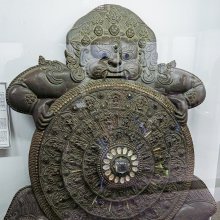Dharmakara, Dharmākara: 9 definitions
Introduction:
Dharmakara means something in Buddhism, Pali, Hinduism, Sanskrit. If you want to know the exact meaning, history, etymology or English translation of this term then check out the descriptions on this page. Add your comment or reference to a book if you want to contribute to this summary article.
Images (photo gallery)
In Hinduism
Purana and Itihasa (epic history)
Source: archive.org: Puranic EncyclopediaDharmākara (धर्माकर).—A righteous house-holder. Once a prince entrusted his beautiful wife with Dharmākara and went away. Though she lived with him for six months he did not have any kind of contact with her. The prince returned. Wicked people tried to arouse doubts about the chastity of his wife and the householder. But it was futile. Still fearing calumny Dharmākara entered fire. In that test by fire he came out victorious. Not only did his body remain unscorched, but also that the faces of the wicked people who blamed him were filled with leprosy and became ugly. (Padma Purāṇa, Sṛṣṭi khaṇḍa, Chapter 50).

The Purana (पुराण, purāṇas) refers to Sanskrit literature preserving ancient India’s vast cultural history, including historical legends, religious ceremonies, various arts and sciences. The eighteen mahapuranas total over 400,000 shlokas (metrical couplets) and date to at least several centuries BCE.
In Buddhism
Mahayana (major branch of Buddhism)
Source: Wisdom Library: Maha Prajnaparamita SastraDharmākara (धर्माकर) is the name of a Bhikṣu according to the 2nd century Mahāprajñāpāramitāśāstra (chapter XV). Accordingly, “Although the Buddha Lokeśvararāja guided the Bhikṣu Dharmākara in the ten directions to contemplate the pure universes, the qualities (guṇa) and the power (bala) of this Bhikṣu were too weak and he was unable to see the supremely pure universes”.
Note: This Bhikṣu is none other than the future Buddha Amitābha whose births are told in the Sukhāvatīvyūha.

Mahayana (महायान, mahāyāna) is a major branch of Buddhism focusing on the path of a Bodhisattva (spiritual aspirants/ enlightened beings). Extant literature is vast and primarely composed in the Sanskrit language. There are many sūtras of which some of the earliest are the various Prajñāpāramitā sūtras.
Tibetan Buddhism (Vajrayana or tantric Buddhism)
Source: archive.org: The Indian Buddhist IconographyDharmakara (धर्मकर) refers to an ancient king of China (and eventually king of Nepal), according to the Svayambhūpurāṇa, which extolls the glories of the Svayambhūkṣetra (“place of the Self-Born”).—It is said therein that Mañjuśrī hailed from China, where he was living on mount Pañcaśīrṣa (the Hill of Five Peaks). He was a great saint with many disciples and followers, including Dharmakara, the king of the country. Receiving divine intimation one day that the self-born Lord Ādibuddha, has manifested himself as a flame of fire on a lotus on the waters of Lake Kālīhrada in Nepal, he forthwith set out for that country along with a large number of his disciples, his two wives and king Dharmakara, with the intention of paying homage to the deity. [...] Mañjuśrī lost no time in erecting a temple over the flame of fire and on a hillock nearby he made his own abode, and also a vihāra (or monastery) still known as the Mañjupattana, for his disciples. Lastly, he made Dharmakara the King of Nepal.

Tibetan Buddhism includes schools such as Nyingma, Kadampa, Kagyu and Gelug. Their primary canon of literature is divided in two broad categories: The Kangyur, which consists of Buddha’s words, and the Tengyur, which includes commentaries from various sources. Esotericism and tantra techniques (vajrayāna) are collected indepently.
Languages of India and abroad
Sanskrit dictionary
Source: Cologne Digital Sanskrit Dictionaries: Edgerton Buddhist Hybrid Sanskrit DictionaryDharmākara (धर्माकर).—name of a monk (of old): Sukhāvatīvyūha 7.3 ff.; he became the Buddha Amitābha, 28.10.
Source: Cologne Digital Sanskrit Dictionaries: Aufrecht Catalogus CatalogorumDharmākara (धर्माकर) as mentioned in Aufrecht’s Catalogus Catalogorum:—poet. [Sūktikarṇāmṛta by Śrīdharadāsa]
Source: Cologne Digital Sanskrit Dictionaries: Monier-Williams Sanskrit-English Dictionary1) Dharmakāra (धर्मकार):—[=dharma-kāra] [from dharma > dhara] m. ‘law-doer’, Name of a man, [Monier-Williams’ Sanskrit-English Dictionary]
2) Dharmākara (धर्माकर):—[from dharma > dhara] m. ‘mine of virtue or l°’, Name of a poet, [Catalogue(s)]
3) [v.s. ...] of the 99th Buddha
4) [v.s. ...] of a disciple of B° Lokeśvara-rāja
5) [v.s. ...] Name of a Buddh. translator.
[Sanskrit to German]
Sanskrit, also spelled संस्कृतम् (saṃskṛtam), is an ancient language of India commonly seen as the grandmother of the Indo-European language family (even English!). Closely allied with Prakrit and Pali, Sanskrit is more exhaustive in both grammar and terms and has the most extensive collection of literature in the world, greatly surpassing its sister-languages Greek and Latin.
Kannada-English dictionary
Source: Alar: Kannada-English corpusDharmakara (ಧರ್ಮಕರ):—
1) [noun] a man of righteous actions.
2) [noun] a man holding a bow.
Kannada is a Dravidian language (as opposed to the Indo-European language family) mainly spoken in the southwestern region of India.
See also (Relevant definitions)
Partial matches: Dharma, Kara, Tarma.
Starts with: Dharmakara upadhyaya, Dharmakaraka, Dharmakaramati, Dharmakarana.
Full-text: Tadagadipratishthapaddhati, Dharmakara upadhyaya, Lokeshvararaja, Pancashirsha, Amitabha, Nepal, Kalihrada, Manjupattana, Sukhavativyuha Sutra.
Relevant text
Search found 8 books and stories containing Dharmakara, Dharmākara, Dharmakāra, Dharma-kāra, Dharma-kara; (plurals include: Dharmakaras, Dharmākaras, Dharmakāras, kāras, karas). You can also click to the full overview containing English textual excerpts. Below are direct links for the most relevant articles:
Maha Prajnaparamita Sastra (by Gelongma Karma Migme Chödrön)
Appendix 6 - The Legend of the Buddha Lokeśvararāja and the bhikṣu Dharmākara < [Chapter XV - The Arrival of the Bodhisattvas of the Ten Directions]
Act 10.9: The transformed Sahā universe compared with the Padmāvatī universe < [Chapter XV - The Arrival of the Bodhisattvas of the Ten Directions]
Bhūmi 8: the unshakeable ground (acalā) < [Chapter XX - (2nd series): Setting out on the Mahāyāna]
Socially Engaged Buddhism (with reference to Australian society) (by Phuong Thi Thu Ngo)
Reciting the Buddha’s name (Pure Land) < [Chapter 2]
Blue Annals (deb-ther sngon-po) (by George N. Roerich)
Chapter 10 - The fourth Kālacakra lineage < [Book 10 - The Kālacakra]
The Larger Sukhavativyuha Sutra
Stupas in Orissa (Study) (by Meenakshi Chauley)
Buddha Images < [Chapter 5]
The Scientific Outlook Of Buddhism (by Wang Chi Biu)
